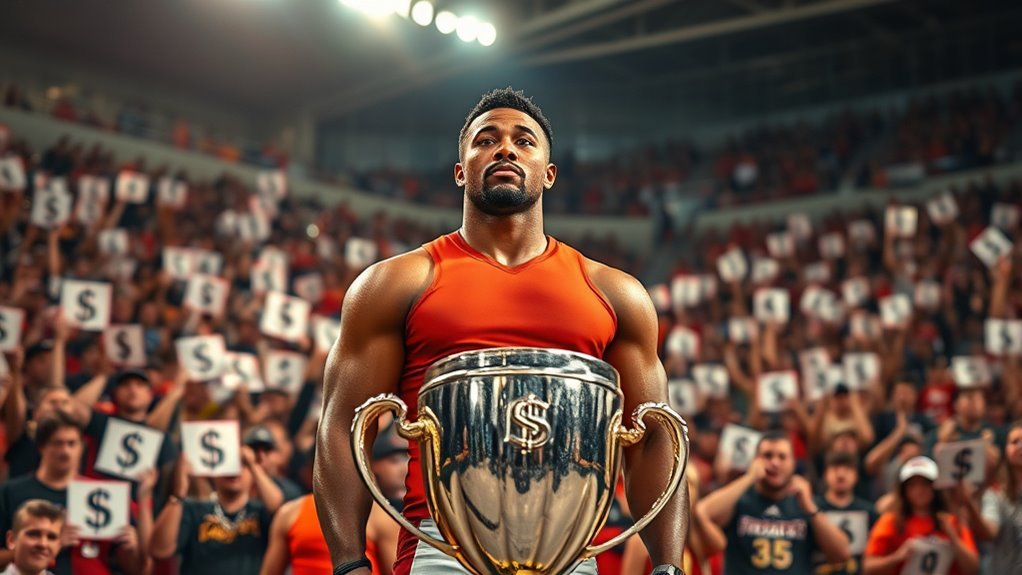Athlete salaries can vary widely based on factors like the sport, individual performance, and market demand. For instance, NBA players average around $8 million, while NFL players make about $3 million due to larger rosters. Endorsements can considerably boost earnings too, often exceeding league salaries for top athletes. Additionally, salary caps and revenue sharing play a role in determining pay. If you explore further, you’ll discover how all these elements shape an athlete’s financial success.
Factors Influencing Athlete Salaries
When considering how much athletes get paid, it’s essential to recognize the various factors that influence their salaries. Market demand plays a huge role; the more fans crave a player, the higher their earning potential. You’ve likely noticed that players performing exceptionally well often command higher salaries. Their skills can elevate a team’s success, making them invaluable assets. Additionally, if a league’s popularity skyrockets, it creates bigger revenue streams, allowing teams to invest more in their star athletes. Ultimately, the intersection of these elements shapes an athlete’s paycheck. It’s not just about talent, but how that talent resonates within the market, making it a complex yet fascinating dance of economics and performance.
Salary Comparisons Across Different Sports
Athletes in various sports often see striking differences in their salaries, reflecting both the popularity of the sport and the revenue it generates. These salary disparities can be surprising, as fans may not realize how much sport popularity influences earnings.
| Sport | Average Salary |
|---|---|
| NFL | $3 million |
| NBA | $8 million |
| MLB | $4 million |
As you can see, the average salaries vary widely across these leagues. The NFL, while immensely popular, has a larger roster size, which dilutes individual earnings. The NBA, on the other hand, benefits from lucrative TV deals and a global fan base, driving up salaries. Understanding these nuances helps you appreciate the financial landscape athletes navigate.
The Impact of Endorsements and Sponsorships
While many fans focus on athletes’ salaries from their respective leagues, the financial reality is often shaped even more by endorsements and sponsorships. Endorsement deals can greatly boost an athlete’s income, sometimes surpassing their league earnings. When you’re a standout player, brands line up to partner with you, enthusiastic to leverage your influence. This can lead to lucrative contracts, giving you freedom to explore personal projects or investments.
Sponsorship effects also extend beyond just money; they elevate your brand, making you a household name. As you build your image, the opportunities multiply, allowing you to dictate terms. In this world, your performance on the field or court directly translates to your marketability off it, reshaping your financial landscape.
Salary Caps and Revenue Sharing in Professional Leagues
Although many fans might not realize it, salary caps and revenue sharing play an essential role in determining how much athletes get paid in professional leagues. These mechanisms guarantee competitive balance and financial stability. Here’s how they work:
- Salary Cap Mechanisms: These limit the total amount a team can spend on player salaries, preventing wealthy franchises from monopolizing talent.
- Revenue Sharing Models: Teams share a portion of their revenue, allowing smaller markets to remain competitive and invest in players.
- Guaranteeing Fair Play: Together, these strategies promote equality and give every athlete a fair chance to earn a decent salary.
Understanding these aspects can help you appreciate the intricate financial landscape of professional sports and how it affects athletes’ paychecks.
The Role of Agents and Negotiation in Contract Values
When it comes to securing lucrative contracts, the role of agents and negotiation cannot be overstated. Your agent is your advocate, maneuvering the complex world of contract negotiations to guarantee you get what you deserve. They understand market trends and leverage their connections, maximizing your earning potential. With their expertise, you can focus on your game, knowing they’re fighting for your financial freedom. Keep in mind, though, that agent commissions can eat into your earnings, so choosing the right agent is essential. The negotiation process involves more than just numbers; it’s about creating opportunities that align with your goals. Ultimately, a skilled agent can make a significant difference in the contracts you sign and the financial security you achieve.
Frequently Asked Questions
What Is the Average Salary for Amateur Athletes?
You’d think amateur athletes rake in the big bucks, right? In reality, the average salary for amateurs is often a mere pittance, typically just a few thousand dollars a year, if that. While they may not get paid much, they often chase sponsorship opportunities to supplement their income. It’s all about passion and the freedom to pursue their sport, even if the financial rewards don’t match their dedication and skill.
How Do Injury Rates Affect Athlete Salaries?
Injury rates can greatly impact athlete salaries. When you consider how injuries affect performance, teams often make salary adjustments based on a player’s health and reliability. If an athlete’s injury history raises concerns, they might face lower offers or shorter contracts. Conversely, those who maintain good health typically earn more, as they’re seen as safer investments. Ultimately, an athlete’s ability to stay injury-free can be the key to maximizing their earning potential.
Are There Salary Disparities Between Genders in Sports?
Oh, sure! Gender pay in sports is just a delightful game of “who gets what.” You’ve got the men raking in millions while the women are left scrambling for crumbs. It’s like a twisted reality show, but we’re all rooting for sports equity, right? It’s high time you demand fairness, so next time you watch a match, remember: talent doesn’t have a gender, and neither should paychecks. Let freedom ring, folks!
How Do Player Performance Metrics Influence Contract Negotiations?
Player performance metrics play an essential role in contract negotiations, as teams increasingly rely on performance analytics to gauge a player’s value. When you excel in key metrics, you can negotiate a higher contract value, reflecting your contributions to the team’s success. Teams want to invest in players who show promise and consistency, so focusing on improving your stats can lead to more lucrative deals, giving you the financial freedom athletes often seek.
What Happens to Athlete Salaries During a Lockout?
During a lockout, athlete salaries can take a hit, like a ship tossed in a storm. The lockout impact halts games and negotiations, leaving players in limbo. You might see salaries freeze or drop, as teams cut costs. Negotiating power shifts, and players often have to compromise to regain their footing. It’s a tough time, but the desire for freedom and fair compensation drives them to fight for better deals once the storm passes.




